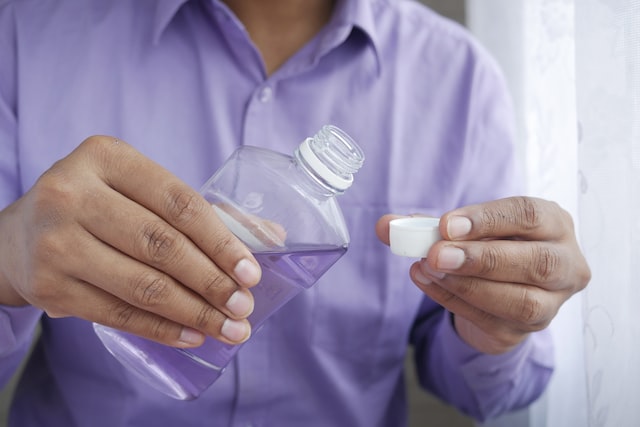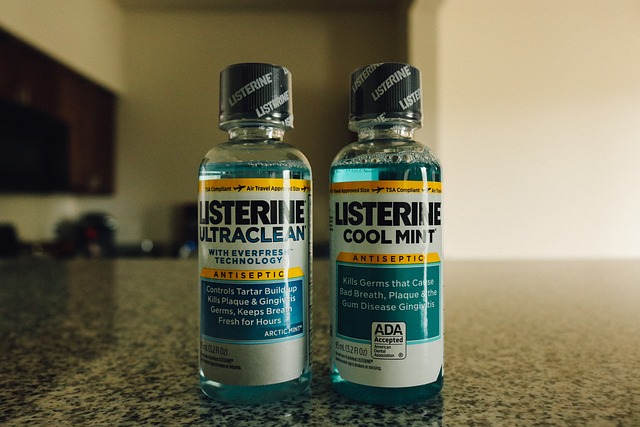There are various distinctions between gargling and mouthwash. Gargling is primarily used to relieve sore throat and irritation, while mouthwash helps prevent tooth decay, fights germs, freshens breath and can reach areas a toothbrush cannot. Although both may be beneficial for oral hygiene, it’s important to know the appropriate use of each one to get the most out of their benefits for your overall health.
Gargle
Gargling is a common practice that helps to rinse the mouth and throat. It involves making an oral solution with water and gargling it around in the mouth for 30 seconds to 1 minute before spitting it out. Gargling can help to remove food debris, bacteria, and other irritants from the throat and mouth.
Mouthwash
(Photo by Towfiqu barbhuiya on Unsplash )

Mouthwash is a similar product to gargle, but it is typically used for a longer duration of time. Most mouthwashes are meant to be swished around in the mouth for 30 seconds to 1 minute before being spit out. Mouthwashes often contain antimicrobial ingredients that help to kill bacteria and other germs in the mouth. Some mouthwashes also contain fluoride, which can help to prevent tooth decay.
When to use gargle and mouthwash
Gargling is typically done with warm water and helps to remove debris and mucus from the back of the throat. Mouthwash, on the other hand, is an antiseptic solution that is used to help kill bacteria in the mouth.
Mouthwash can be used for a variety of purposes, such as freshening breath, reducing plaque, and treating gingivitis. Gargling is most often used to soothe a sore throat or relieve congestion.
In general, gargle first if you have a cold or other respiratory infection. Finish with a swish of mouthwash to help reduce any residual bacteria in your mouth.
(You should always talk to your dentist or doctor before using either.)
Is gargling better than rinsing?
There are a few key differences between gargling and mouthwash. Gargling is generally considered to be more effective than rinsing because it allows the solution to come into contact with the back of the throat, where many germs reside. Mouthwash, on the other hand, mainly cleans the teeth and doesn’t do much to kill germs in the throat.
Gargling is also a better option if you have a sore throat, as the warm water can help soothe irritated tissue. Mouthwash, on the other hand, may actually irritate a sore throat.
So, if you’re looking for an effective way to kill germs and prevent infection, gargling is your best bet. If you’re just trying to freshen your breath or clean your teeth, mouthwash will do the trick.
What is the meaning of mouth wash?
There are a few different ways to think about the meaning of mouthwash. For some people, mouthwash is simply a way to freshen their breath. For others, it is a way to help keep their teeth and gums healthy. And for still others, it is a way to help prevent or treat bad breath.
Most mouthwashes contain alcohol, which helps to kill bacteria that can cause bad breath. Some also contain fluoride, which can help to prevent cavities. And still others contain ingredients that help to remove plaque from teeth or neutralize acids in the mouth that can lead to tooth decay.
So, there is no one-size-fits-all answer to the question of what the meaning of mouthwash is. It really depends on what you want or need it to do for you. But regardless of your reasons for using it, mouthwash can be a helpful part of your oral care routine.
What are the two types of mouthwash?
There are two types of mouthwash: Medicated and Non-medicated.
Medicated mouthwashes contain ingredients that help to kill bacteria, reduce inflammation, and fight plaque.
Non-medicated mouthwashes do not contain these ingredients and are used simply to freshen breath.
Do you use mouthwash before or after brushing?
There is no definitive answer to this question as it depends on personal preference. Some people prefer to gargle with mouthwash before brushing their teeth in order to freshen their breath and remove any residual food debris. Others prefer to brush their teeth first and then use mouthwash as a final step to cleanse the mouth and kill any remaining bacteria. Whichever method you choose, just be sure to follow the instructions on the mouthwash bottle for best results.
What are gargles in pharmacy?
Gargles are a type of mouthwash that is used to treat throat and mouth infections. Gargles usually contain an antiseptic, such as alcohol, which helps to kill bacteria and viruses. Gargles are typically used for short-term treatment of infections, and are not meant to be used on a daily basis.
Is mouthwash a chemical?
Mouthwash, also known as mouthrinse, is a liquid product that is used to clean the mouth. It is typically composed of water, alcohol, and various chemicals.
The most common type of mouthwash is antiseptic mouthwash, which contains ingredients such as ethanol or povidone-iodine that help to kill bacteria in the mouth. These products can be purchased over-the-counter or prescribed by a dentist or doctor. There are also non-antiseptic mouthwashes that do not contain alcohol or chemicals, which can be used for people who are sensitive to these ingredients.
Mouthwash is typically used after brushing and flossing teeth, and it can help to remove food particles and plaque from the teeth and gums. Additionally, using mouthwash can freshen breath and help to prevent cavities and gum disease.
Why you should not use mouthwash everyday?
There are a few reasons why you shouldn’t use mouthwash everyday. First, mouthwash can actually strip away the good bacteria that live in your mouth and keep harmful bacteria at bay. This can lead to an overgrowth of bad bacteria, which can cause gum disease, tooth decay, and other oral health problems. Second, mouthwash can be very drying to the tissues in your mouth, which can lead to irritation and discomfort. Finally, using mouthwash too often can give you a false sense of security about your oral health and may cause you to miss early signs of dental problems.
Does mouthwash damage teeth?
Mouthwashes are available over-the-counter and by prescription. They typically contain alcohol, which can be drying to the teeth and gums. This can lead to increased tooth sensitivity and gum recession. In addition, mouthwashes can contain other ingredients that may be harmful to teeth, such as fluoride.
It is important to talk to your dentist or dental hygienist about which mouthwash is right for you.
What is mouth gargling?
Mouth gargling is a practice that dates back centuries. It involves using water to flush out the mouth and remove debris, bacteria, and other irritants. Gargling is generally considered safe for most people, though there are a few exceptions. Some experts believe that mouth gargling can help prevent or treat sore throats, gingivitis, and bad breath.
There are many different ways to gargle. The most common method is to mix water with salt and swish it around in your mouth for 30 seconds to a minute before spitting it out. You can also use diluted apple cider vinegar or baking soda. Some people add essential oils to their gargling solution for an extra boost of antibacterial power.
To get the most benefit from gargling, be sure to do it regularly and correctly. Swish the solution around your teeth and gums, taking care to reach all areas of your mouth. Spit it out after the recommended time has elapsed. Rinse your mouth with plain water afterwards if desired.
Why is it called gargling?
Gargling is a common practice that has been around for centuries. The word “gargle” actually comes from the Latin word “gurgulio,” which means “throat.” Gargling is typically done with water, but other liquids can be used as well, such as mouthwash.
NOTE: BE SURE TO CONSULT A QUALIFIED DENTIST OR DOCTOR BEFORE OR IF YOU WANT TO USE ANY FORM OF MOUTHWASH OR GARGLE, THIS ARTICLE CONTAINS DETAILS FOR INFORMATION PURPOSES ONLY
Featured Image By – Image by Olya Adamovich from Pixabay








